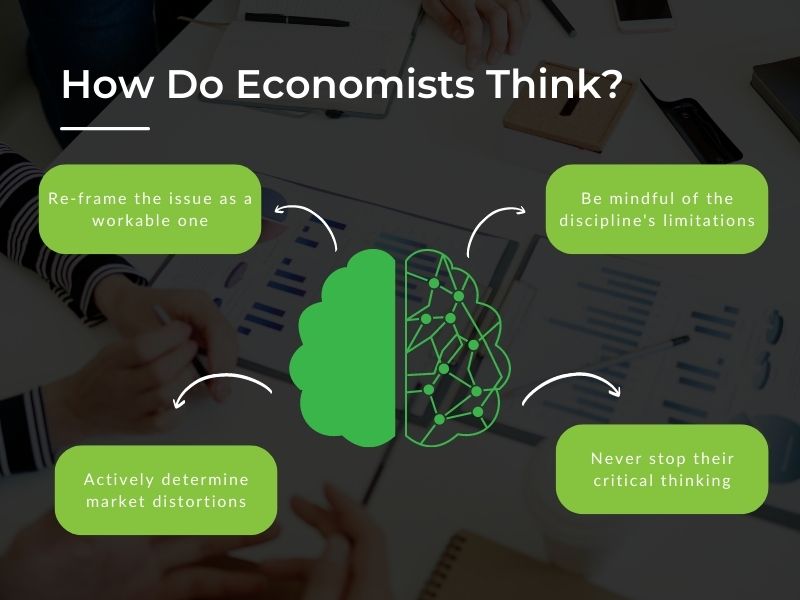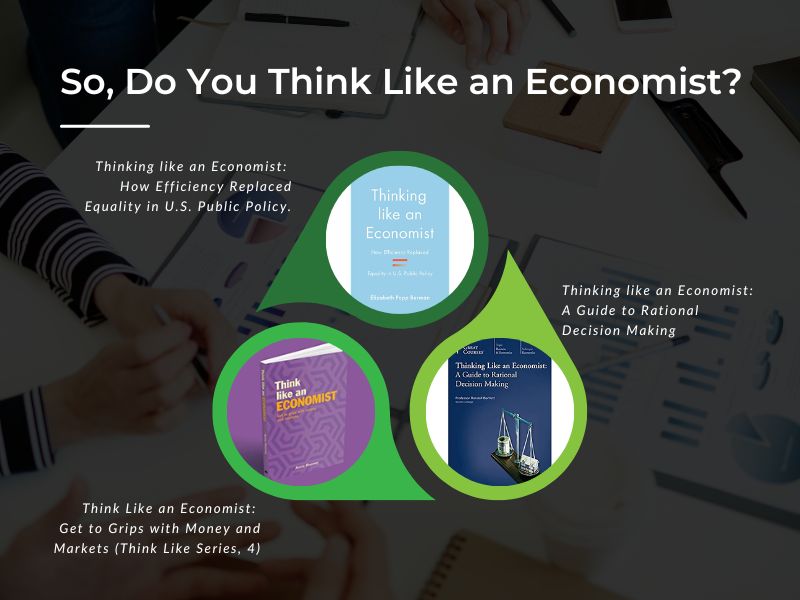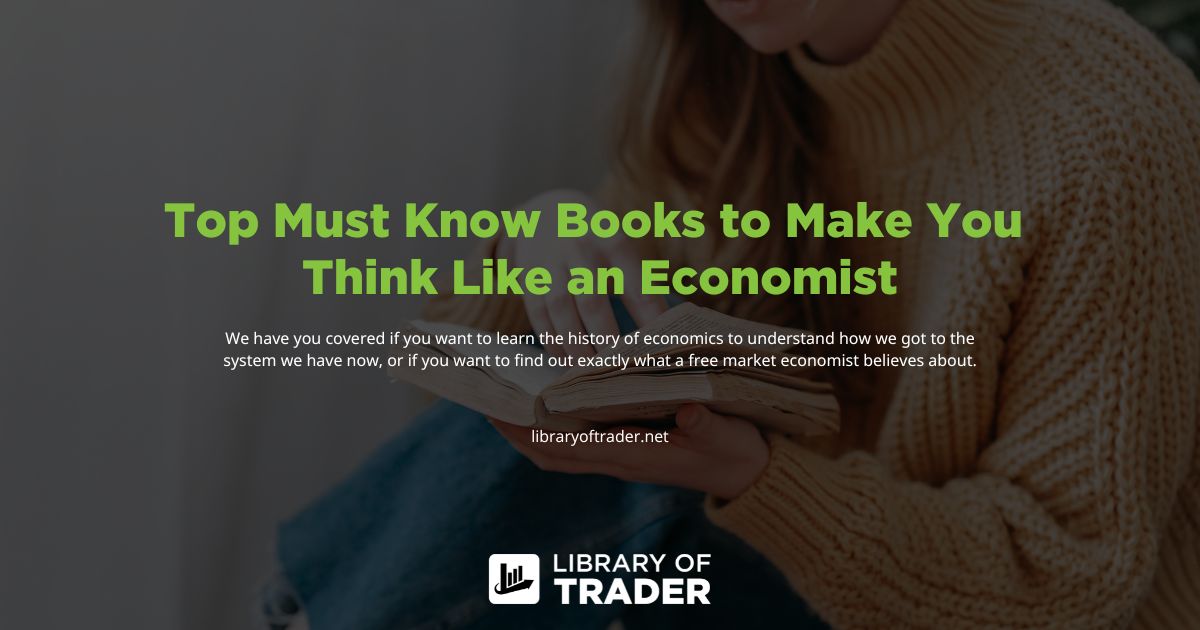Introduction
It is impossible to describe the world around us without a grasp of economics. Economic data may influence public policies and movements, and a lack of fundamental understanding can stymie progress. No one can analyze data unless they understand basic best practices, such as the fact that a single statistic or number (even averages) can’t tell you much. Fortunately, getting a solid grasp of economics and data analysis without a degree in advanced mathematics is doable.
As part of this Think Like an Economist books review, I’ll share my top recommendations. However, you must first understand what it means to think like an economist, and how economists do so.
What Does Thinking Like an Economist Mean?
At its most basic, thinking like an economist includes examining facts without allowing opinion or logical flaws to enter the equation. You can better understand this term via my previous blog called What Does It Mean to Think Like an Economist.
How Do Economists Think?
The following are some of the highlights of economists’ performance when dealing with problems:

Re-frame the issue as a workable one
For example, they would transform a genuine market into a competitive market at equilibrium, in which the market has cleared, there are rational participants, and there is enough information, money, and competition. Incentives, supply and demand, opportunity cost, risks, transaction costs, tradeoffs, preferences, recession and cost-benefit analysis would all be considered.
This is the initial phase, where smart economists begin their thinking (and poor economists end their thinking), and where knowing the fundamentals is critical. They would then start loosening assumptions and properly considering what happens when each assumption is loosened. They would recognise preconceptions to the degree that they were unable to relax them.
Be mindful of the discipline’s limitations
Economists would differentiate between value production (enlarging the pie) and value allocation (the size of the slices). Another way to put it is that they would never conflate efficiency with equality, but they would consider tradeoffs. And they’d know that economics has a lot more to say about how to increase the size of the pie than the “optimal” method to slice it.
In other words, an economist may assess efficiency gains and losses versus equity gains and losses, but economics cannot comment on the ethically proper method to split the pie.
Actively determine market distortions
Economists would recognize that markets may and do fail in the absence of the necessary ingredients, and they would focus on how to build circumstances in which markets can thrive and accomplish their job of shifting resources to the highest and most productive uses.
Instead of getting stuck on math, economists would focus on human behavior and psychology first and math issues second. Even though they were all phenomenally good at math, it wasn’t where they’d begin.
Never stop their critical thinking
Economists would prioritize the proper question over the “right” answer. They would evaluate the data during their financial market research and, if they judged that it had been accurately acquired and processed, they would believe in that data rather than any preconceived notion of how the world is meant to function.
Economists would not use any excuse to cease critical thinking. They would challenge and test their own findings, as well as foresee (and admit) where their arguments were vulnerable to critique.
So, Do You Think Like an Economist?
After reading what I said above, do you find yourself thinking like an economist? No worries if you don’t, here are the top books to read if you wish to learn how to think like them.

Thinking like an Economist: How Efficiency Replaced Equality in U.S. Public Policy.
In Thinking like an Economist: How Efficiency Replaced Equality in U.S. Public Policy, The book’s author, Elizabeth Popp Berman, explains the tale of how a particular method of thinking an “economic style of reasoning” became prominent in Washington between the 1960s and the 1980s; and how it still substantially narrows discussions over public policy today.
Key highlights:
- One of the significant highlights of the book is that: It begins with a fascinating history of economics as a discipline. The author demonstrates how economists used to be focused on distinct problems and areas of inquiry, and how, when active in public policy, they provided several types of knowledge.
- Also, the author had shown us an intriguing and well-researched look at how neoclassical, mainstream economic theory came to be the standard in US public policy.
This book is highly recommended for:
- Anybody interested in the significance of economics in American public policy and how it gotta be so important.
- Anyone who is interested in the history of economics of the USA.
Think Like an Economist: Get to Grips with Money and Markets (Think Like Series, 4)
Think Like an Economist: Get to Grips with Money and Markets (Think Like Series, 4) is a lighthearted introduction to the fundamental concepts of economics, untangling its complexities and exposing how people, groups, and nations allocate resources. The book uses a Q&A structure to answer questions like:
- Why not simply print more money?
- Is cash on its last legs?
- How does the stock market function?
- Is the entire planet now capitalist?
The books’ author – Anne Rooney analyzes how economics may be utilized to enhance living standards and make the world a better place in a funny and easy-to-understand approach.
Key highlights:
- The book includes excellent refresher and reference. The book covers precise and pleasant stories on various economic challenges to support readers to easily get started with economics.
- The book analyzes how economics may be used to raise living standards and make the world a better place by focusing on problems about products and services, supply and demand. Each chapter addresses a major issue in an interesting manner, demonstrating how economics has a clear, practical role in our daily lives and thoughts.
- The book tells the stories of many of the world’s finest economists and covers economic history.
This book is highly recommended for:
- Those who need a refresher in economics after a long time may forget about it.
- Those who have just got started in their economics understanding.
Thinking like an Economist: A Guide to Rational Decision Making
The book’s author – Professor Bartlett – introduces some of the fundamental ideas and notions that define the lenses through which economists view the world, requiring no prior economics training. He then demonstrates how to utilize these basic analytical skills to comprehend what you see through those glasses.
Key highlights:
- The book helps readers identify the many different scenarios in which economics influences their life and how to use the tools that may help them make the greatest decisions in those situations.
- The case studies, useful tactics, and economic insights will provide readers with a trustworthy toolset for thinking more like an ordinary economist and approaching situations in their own lives with a more informed, seasoned eye.
This book is highly recommended for:
- Those who are new to the economy.
- Those who enjoy audio books rather than the normal ones.
In conclusion
Hopefully, there was anything on that list that piqued your interest. Each of the books on the list will provide you with a thorough understanding of at least one economic theory, and you will be able to reference them in essays and other assignments at university, so they are well worth reading.


